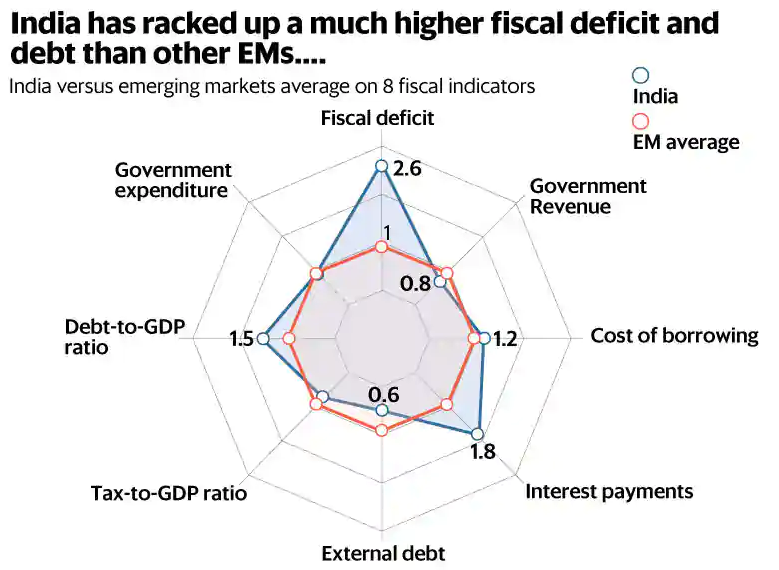Indian Economy
Need For A Fiscal Council
This editorial analysis is based on the article India does need a Fiscal Council which was published in The Hindu on 25th of August 2020. It analyses the the need and benefit of an independent Fiscal Council in India
According to recent estimates of the Controller General of Accounts (CGA), the fiscal deficit of the Centre government in 2019-20 will be near 4.6%, which is 0.8% higher than the revised estimate.
Further, fiscal deficit will tend to increase in this financial year, due to economic slowdown amid Covid-19 pandemic. Given this deteriorating state of fiscal health, the N.K. Singh committee in 2017, has suggested establishing an independent fiscal council.
Similar recommendations were mooted by the 13th and 14th finance commissions, which also advocated the establishment of independent fiscal agencies to review the government’s adherence to fiscal rules, and to provide independent assessments of budget proposals.
Therefore, in order to follow the path of fiscal consolidation & prudence, there is a need to look into prospects and challenges owing to a Fiscal council.
Fiscal Council
- A Fiscal Council is an independent fiscal institution with a mandate to promote stable and sustainable public finances.
- The institution assists in calibrating sustainable fiscal policy by making an objective and scientific analysis.
The important tasks of a Fiscal council include:
- Independent analysis, review and monitoring and evaluating of government’s fiscal policies and programmes.
- Developing or reviewing macroeconomic and/or budgetary projections.
- Costing of budget and policy proposals and programmes.
- Presenting policy makers with alternative policy options.
The Need of Fiscal Council
Mismatched Budgets
- Historically, interim budgets in India have consistently overestimated revenue growth and underestimated expenditure growth.
- An analysis of the projected, revised, and actual budget figures since 1991 by Economic and Political Weekly Research Foundation showed that deviations from budget estimates tend to be extraordinarily high for budget estimates presented in interim budgets.
- Similarly the finance ministry’s overall record in forecasting projections has been consistently poor under successive finance ministers in regular budgets too.
- The finance ministry tends to overstate revenue projections and understate expenditures in regular budgets.
Tax Maladministration
- The over-ambitious revenue targets combined with the lack of transparency in tax administration makes taxmen to exceed their authorities to fulfil unrealistic targets.
- A 2017 CAG report found that the tax department had resorted to ‘irregular’ and ‘unwarranted’ methods to meet their tax targets.
Dressing Up of Fiscal Numbers
- When the Government fails its revenue or expenditure targets it resorts to different cover up strategies.
- If oil bonds were the instrument of choice to dress up fiscal deficit numbers earlier, now the preferred mode of financing the deficit is the disinvestment of public sector enterprises to boost stake sales by the government.
- The country’s biggest insurer, Life Insurance Corp. of India (LIC) has been the biggest lifeline for the country’s divestment programme in recent years.
Coordination between GST Council and Finance Commission
- The GST Council normally has no clue of what the Finance Commission is doing and Finance Commission has even lesser clue of what the GST Council is doing.
- There is a need for coordination between the finance commission as well as the GST Council.
Limiting the borrowings by the Central Government
- Article 293 provides a constitutional check over the borrowings by the State government but there is no such restriction on the Central government.
Benefits
- More Transparency: An unbiased report to Parliament helps to raise the level of debate and brings in greater transparency in regard to public money.
- Discourage Populist Shift of Government Expenditure: An independent analysis of various policies and programmes can help to avoid the political culture of populist spending for political gains and would improve objectivity.
- Raising Public Awareness: Scientific estimates of the cost of programmes and assessment of forecasts could help in raising public awareness about their fiscal implications and make people understand the nature of budgetary constraint.
- Boost Accuracy: Presence of an independent fiscal council tends to boost accuracy of fiscal projections and helps countries stick to fiscal rules better. In this way, the fiscal council will work as a conscience keeper in monitoring rule-based policies.
- More Accountability: Fiscal councils in most countries are able to discipline lawmakers through ‘comply or explain’ obligations which entail governments to at least explain why they diverge from the fiscal council’s views and thus brings more accountability.
Challenges
Dilute Finance Ministry’s authority
- Forcing the Finance Ministry to use someone else’s estimates will dilute its accountability.
- If the estimates go awry, it will simply shift the blame to the fiscal council.
Executive Control of Elected Government
- It is also believed that it will prevent the government from moulding fiscal rules depending upon the situation and need.
- It may create rigid rules for fiscal prudence.
Conclusion
- There is a need for systems and institutions to ensure checks and balances in the system for greater good.
- The government borrows and spends more in order to support its welfare programmes or sometimes to further their political agendas.
- This means a steep rise in debt which will jeopardise medium-term growth prospects, an issue prominently flagged by all the rating agencies in the recent evaluations.
- Fiscal Council will help in improving comprehensiveness, transparency and accountability of Budgetary data and will fix this issue.
|
Drishti Mains Question Fiscal council is a step towards fixing government’s accountability and fiscal transparency. Discuss. |





